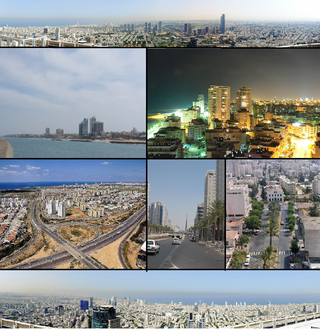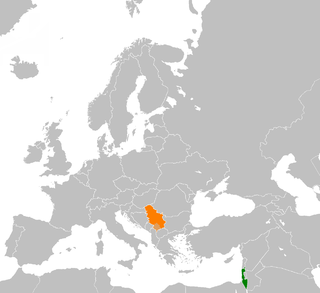
Tel Aviv-Yafo, usually referred to as just Tel Aviv, is the most populous city in the Gush Dan metropolitan area of Israel. Located on the Israeli Mediterranean coastline and with a population of 474,530, it is the economic and technological center of the country and a global High tech hub. If East Jerusalem is considered part of Israel, Tel Aviv is the country's second-most-populous city, after Jerusalem; if not, Tel Aviv is the most populous city, ahead of West Jerusalem.

Gush Dan or Tel Aviv metropolitan area is a conurbation in Israel, located along the country's Mediterranean coastline. There is no single formal definition of Gush Dan, though the term is in frequent use by both governmental bodies and the general public. It ranges from combining Tel Aviv with cities that form an urban continuum with it, to the entire areas from both the Tel Aviv District and the Central District, or sometimes the whole Metropolitan Area of Tel Aviv, which includes a small part of the Southern District as well. Gush Dan is the largest conurbation and metropolitan area in Israel, with the metropolitan area having an estimated population of 4,156,900 residents, 89% of whom are Israeli Jews.

Tourism in Israel is one of the country's major sources of income, with a record 4.55 million tourist arrivals in 2019. Tourism contributed NIS 20 billion to the Israeli economy in 2017, making it an all-time record. Israel offers a plethora of historical and religious sites, beach resorts, natural sites, archaeological tourism, heritage tourism, adventure tourism, and ecotourism. For practical reasons, this article also covers tourism in the Israeli-occupied West Bank and the occupied Golan Heights, since it is closely interconnected with the mass tourism in Israel. Over the millennia, the Holy Land has been amongst the most visited lands in the world.

Israel–South Africa relations refer to the current and historic relationship between the Republic of South Africa and the State of Israel. As of January 2024, South Africa maintains only “limited political and diplomatic interaction” with Israel due to the ongoing Israeli–Palestinian conflict.
Note: This compilation includes only those attacks on Israelis that resulted in casualties and no Palestinian deaths are recorded. Numerous other attacks which failed to kill, maim, or wound are not included.

Since the 1990s, the Republic of India and the State of Israel have had a comprehensive economic, military, and political relationship. In 1947, India voted against the United Nations Partition Plan for Palestine, but nonetheless recognized Israeli sovereignty in 1950. Israel opened a consulate in Bombay in 1953. Collaboration gradually increased as Israel became a key Indian ally amidst the India–Pakistan conflict; Israel supplied India with armaments, ammunition, and intelligence during the Indo-Pakistani War of 1971 and the Indo-Pakistani War of 1999. Full diplomatic relations were established in 1992, when India opened an embassy in Tel Aviv and Israel opened an embassy in New Delhi. Both countries are members of the I2U2 Group, formed in October 2021, and have stated that they have a strong bilateral relationship, sharing similarities in spirit and facing common challenges, increasingly cooperating in the industrial and technological sectors.

Hinduism in Israel refers to the Hindu population in Israel. In 2020, about 0.01% of Israel's population were Hindus.

The State of Israel and the Islamic Republic of Pakistan have never had formal diplomatic relations. In 1947, Pakistan voted against the United Nations Partition Plan for Palestine, and currently does not recognize Israeli sovereignty. Despite the Pakistani position on the Arab–Israeli conflict, there have been multiple instances of the two countries closely cooperating during events such as the Soviet–Afghan War and the Black September conflict. With regard to the Israeli–Palestinian conflict, Pakistan supports the Palestinian Arabs and endorses the two-state solution. The Pakistani government has maintained that it will not pursue a normalized relationship with Israel until the establishment of an independent Palestinian state within the pre-1967 borders and with East Jerusalem as the Palestinians' capital city. Nevertheless, with Turkey serving as their middle ground, Israel and Pakistan have used their embassies and consulates-general in the cities of Ankara and Istanbul to communicate and exchange necessary information with each other. In 2010, the Pakistani newspaper Dawn reported that Pakistan's Inter-Services Intelligence, following up on reports received in Washington, had gone through Ankara to pass on newly discovered information to Israel's Mossad about an upcoming terrorist attack in Mumbai, India, where a Jewish cultural centre was listed as a major target; this information first surfaced on WikiLeaks one year after the 2008 Mumbai attacks were carried out by Lashkar-e-Taiba, a Pakistan-based terrorist organization.

Israeli casualties of war, in addition to those of Israel's nine major wars, include 9,745 soldiers and security forces personnel killed in "miscellaneous engagements and terrorist attacks", which includes security forces members killed during military operations, by fighting crime, natural disasters, diseases, traffic or labor accidents and disabled veterans whose disabilities contributed to their deaths. Between 1948 and 1997, 20,093 Israeli soldiers were killed in combat, 75,000 Israelis were wounded, and nearly 100,000 Israelis were considered disabled army veterans. On the other hand, in 2010 Yom Hazikaron, Israel honored the memory of 22,684 Israeli soldiers and pre-Israeli Palestinian Jews killed since 1860 in the line of duty for the independence, preservation and protection of the nation, and 3,971 civilian terror victims. The memorial roll, in addition to IDF members deceased, also include fallen members of the Shin Bet security service, the Mossad intelligence service, the Israel Police, the Border Police, the Israel Prisons Service, other Israeli security forces, the pre-state Jewish underground, and the Jewish Brigade and the Jewish Legion.

The diplomatic relations between Israel and Serbia were established on January 31, 1992, when Serbia was part of FR Yugoslavia. Israel has an embassy in Belgrade and Serbia had one in Tel Aviv. Yugoslavia was the second country in Europe to recognize Israel in 1948. The two countries have economic and cultural ties, helped by a sizable community of Jews from the former Yugoslavia in Israel. Serbia agreed to move its embassy to Jerusalem on 4 September 2020 but decided not to after Israeli recognition of Kosovo as a sovereign state, something Serbia disputes.

Israel–Ukraine relations are foreign relations between Israel and Ukraine. Both countries recognized each other on 11 May 1949 as the Ukrainian SSR and established de jure diplomatic relations on 26 December 1991 when Ukraine became independent. Israel has an embassy in Kyiv. Ukraine has an embassy in Tel Aviv and a consulate-general in Haifa. There are 30,000 Ukrainians settled in Israel, while Ukraine has one of Europe's largest Jewish communities. Ukraine is also the first state, apart from Israel, to have had both a Jewish president and prime minister simultaneously.

Chile–Israel relations refers to the bilateral and diplomatic ties between Chile and Israel. Chile recognized Israel's independence in February 1949. Both countries established diplomatic relation on 16 May 1950, with Israel sending their first ambassador on that date and Chile sending their first ambassador on 16 June 1952. Chile has an embassy in Tel Aviv. Israel has an embassy in Santiago.

Israel–Thailand relations refers to diplomatic and cultural ties between the State of Israel and the Kingdom of Thailand. The countries have had official relations since June 1954. The Israeli embassy in Bangkok was established in 1958. Since 1996, Thailand has had an embassy in Tel Aviv. Thailand and Israel share a close and friendly relationship, and cooperate on many fields. People-to-people relations between the two countries are also good, as thousands of Thais are employed in Israel, and millions of Israelis have visited and continue to visit Thailand.

Israel and Spain have maintained diplomatic ties since 1986. Israel has an embassy in Madrid. Spain has an embassy in Tel Aviv, and an honorary consulate in Haifa. There is also a General Consulate in Jerusalem, which serves as a diplomatic mission to the city of Jerusalem, Gaza and the territories of the West Bank. In addition to both countries being member states of the United Nations, both countries are members of the Union for the Mediterranean.

Georgia–Israel relations are diplomatic, commercial and cultural ties between Georgia and Israel. Diplomatic relations were formally established on June 1, 1992, alongside establishing diplomatic relations with the US. Georgia has an embassy in Tel Aviv and a consulate in Jerusalem. Israel has an embassy in Tbilisi.

Belarus and Israel established diplomatic relations in 1992. In 1947, Belarus voted in favor for the United Nations Partition Plan for Palestine. Belarus operates an embassy in Tel Aviv, while Israel operates an embassy in Minsk. Around 130,000 Belarusian citizens immigrated to Israel during the 1990s under the Law of Return.

Israel–Philippines relations refers to the bilateral ties between the State of Israel and the Republic of the Philippines.

Relations between Argentina and Israel began shortly after the Israeli Declaration of Independence in 1948, with the countries establishing diplomatic relations on 31 May 1949.

Israel–Sri Lanka relations refers to the bilateral relations between Israel and Sri Lanka.

Yoga tourism is travel with the specific purpose of experiencing some form of yoga, whether spiritual or postural. The former is a type of spiritual tourism; the latter is related both to spiritual and to wellness tourism. Yoga tourists often visit ashrams in India to study yoga or to be trained and certified as yoga teachers. Major centres for yoga tourism include Rishikesh and Mysore.




















